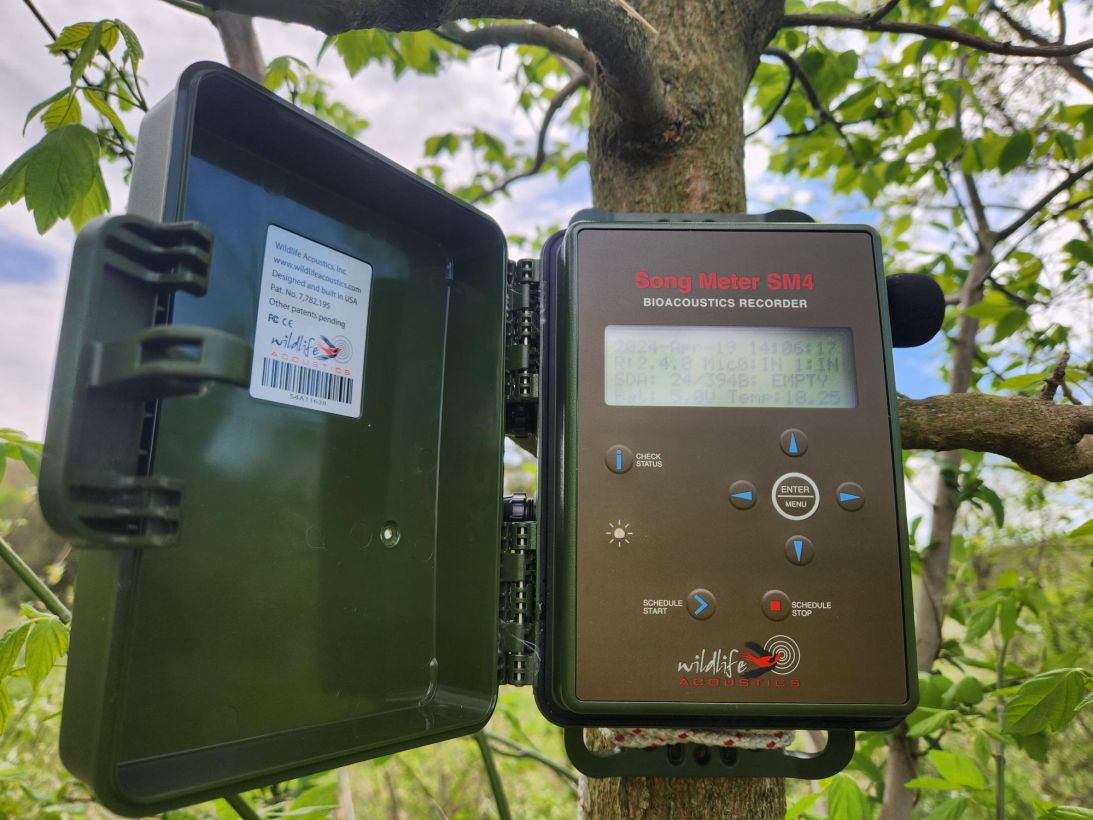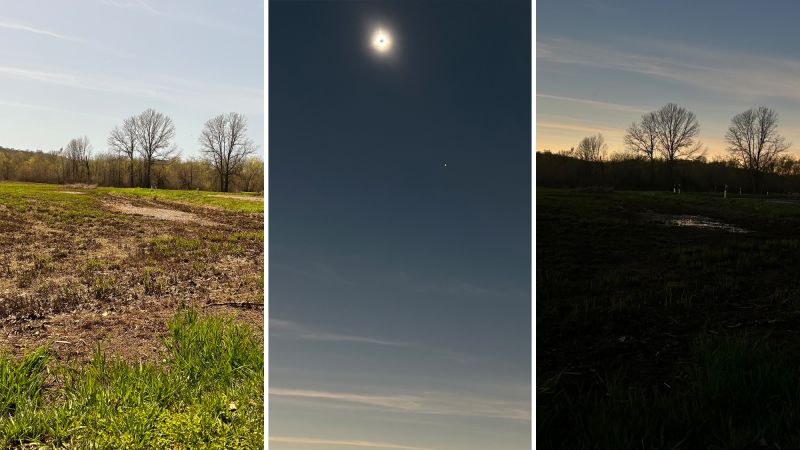The total solar eclipse in North America on April 8, 2024, temporarily reset the biological clocks of some bird species, according to new research.
The eclipse created a dramatic spectacle as the moon moved between Earth and the sun, plunging midday into a few moments of total darkness along a path from Mazatlán, Mexico, to St. Johns in Newfoundland, Canada.
During and after the event, 29 bird species burst into song as though a new day had begun, said the authors of a study published Thursday in the journal Science.
Many of the observations came from citizen scientists located across the eclipse path, which helped broaden the scope of the study.
For scientists who track animal behavior, the eclipse provided the perfect natural experiment to see how birds react to temporary changes in light, something that is difficult to achieve in a laboratory setting. Total solar eclipses typically occur in the same location once every three to four centuries, according to the study, which means that most wild birds have never experienced one.
Studying how wild animals respond to natural events like an eclipse provides insight into how they cope with rapid environmental change and aid in conservation efforts, said lead study author Liz Aguilar, a doctoral student in the evolution, ecology and behavior program at Indiana University Bloomington.
“Light is one of the most powerful forces shaping bird behavior, and even a four-minute ‘night’ was enough for many species to act as if it were morning again,” Aguilar wrote in an email. “That tells us just how sensitive some birds are to changes in light — with clear implications for issues like light pollution and artificial light at night.”
Just like humans, other animals take cues from light for their daily routines, Aguilar said.
During the total solar eclipse of 2017, scientists observed the reactions of zoo animals, with some birds returning to evening roosts while nocturnal species became more active. But Aguilar and her team wanted to specifically document the responses across wild bird species.
The eclipse occurred during North America’s spring, a crucially active time when birds sing to attract mates, defend their territories and migrate during the night, she added. In spring, birds tend to vocalize most around dawn and dusk.
So what might happen to their daily and seasonal rhythms, already so strictly determined by light and dark, if a brief nighttime suddenly occurred during the day? For example, totality lasted for four minutes and 15 seconds in Bloomington, Indiana.
After brainstorming how to enhance public interaction with the rarity of the eclipse and document animal behavior at the same time, the team designed a free smartphone app, Aguilar said.
“Community scientists were absolutely essential to this project,” she said. “The eclipse moved thousands of miles across North America in just a few hours, and our team couldn’t be in all those places at once.”
Nearly 11,000 observations from more than 1,700 users of an app called SolarBird, developed by researchers at Indiana University Bloomington and Ohio Wesleyan University, captured bird behavior across 3,106 miles (5,000 kilometers) of the eclipse path before, during and after the event.
The team also installed tissue box-size recorders across southern Indiana to capture about 100,000 bird vocalizations before, during and after totality, or the moments when the moon entirely blocked the light of the sun.

Users of SolarBird had a simple mission: Spot a bird, observe it for a minimum length of time during the eclipse, and document whether it was singing, flying or eating, among seven other behaviors.
“As we looked at the database that night, we saw the community had also worked its magic,” said Dr. Paul Macklin, associate professor of intelligent systems engineering at Indiana University Bloomington’s Luddy School of Informatics, Computing and Engineering.
The collected recordings were analyzed by BirdNET, an AI system that can identify bird species based on their calls. Experts on the team also analyzed the birdsong.
Of the 52 bird species active during the eclipse, 29 displayed evident changes in their vocalizations, the authors wrote in the study.
As the skies darkened, 11 bird species sang more than usual. During the darkness, some birds fell silent while others became more active.
But the biggest change occurred as the sunlight returned, with 19 species bursting into what the researchers called a “false dawn chorus.”
For instance, barred owls called out four times more often than they typically do. And robins, which have distinctive predawn songs, sang at six times their typical average.
For these birds, the return of the sunlight signaled the start of a new day, effectively resetting their biological clocks, Aguilar said.
“Different bird species greet the dawn in very different ways — some have loud, elaborate dawn choruses, while others are much quieter,” Aguilar said. “We found that species with the most intense dawn choruses were also the ones most likely to react to the eclipse.”
While measuring long-term effects was outside the study’s scope, the team believes lasting impacts would have been minimal. However, the time some birds took reacting to the sudden darkness could have been spent foraging for food, searching for mates or defending their territory, Aguilar said.
Not all bird species reacted the same way, Aguilar added, and bird responses were strongest in the path of totality where the moon completely covered the sun.
“It actually makes sense that not all species reacted the same way — birds differ in how sensitive they are to changes in light,” Aguilar said. “Each species has its own activity patterns, energetic needs, and sensory abilities, so they interpret environmental changes differently.”
For some birds, watching others may have even clued them in that the darkness wasn’t a real night, Aguilar added.
It was important that the authors validated the BirdNET detections, said Dr. Stefan Kahl, creator of and lead for BirdNET Technology in the K. Lisa Yang Center for Conservation Bioacoustics at Cornell University. Though Kahl was not involved in this study, he also participated in research related to bird behavior during the 2024 eclipse.
“BirdNET/AI makes mistakes, but those mistakes are systematic and reproducible, so I would assume that we can see differences in vocal activity during an eclipse,” he said. “We know from our own study that not all birds respond equally — the authors of the study report the same thing, so this sounds reasonable.”
Dr. Andrew Farnsworth, a visiting scientist in the Center for Avian Population Studies at the Cornell Lab of Ornithology, separately studied bird behavior during the 2017 and 2024 eclipses. The new findings align closely with what he observed, and he welcomed the novel addition of crowdsourcing information across North America.
“They are really useful in helping understand how organisms perceive their environment, respond to their environments, and give us some of the raw materials to understand how these behaviors evolve, are maintained, and how they might change,” Farnsworth said.
Understanding which bird species react to changes in light could be key as the world brightens due to the increasing presence of artificial light.
A recent study found that light pollution can disrupt timetable cues in birds, causing them to be vocal for an hour longer than usual — particularly birds with larger eyes or exposed nests. Light pollution can also disorient migrating birds, leading them to fatal collisions with buildings in large cities.
Fortunately, there is a growing movement to curb light pollution and reduce its impacts across a variety of animal species.
“Knowing which species are most affected could help focus conservation efforts where they’re needed most,” Aguilar said.
Sign up for CNN’s Wonder Theory science newsletter. Explore the universe with news on fascinating discoveries, scientific advancements and more.



